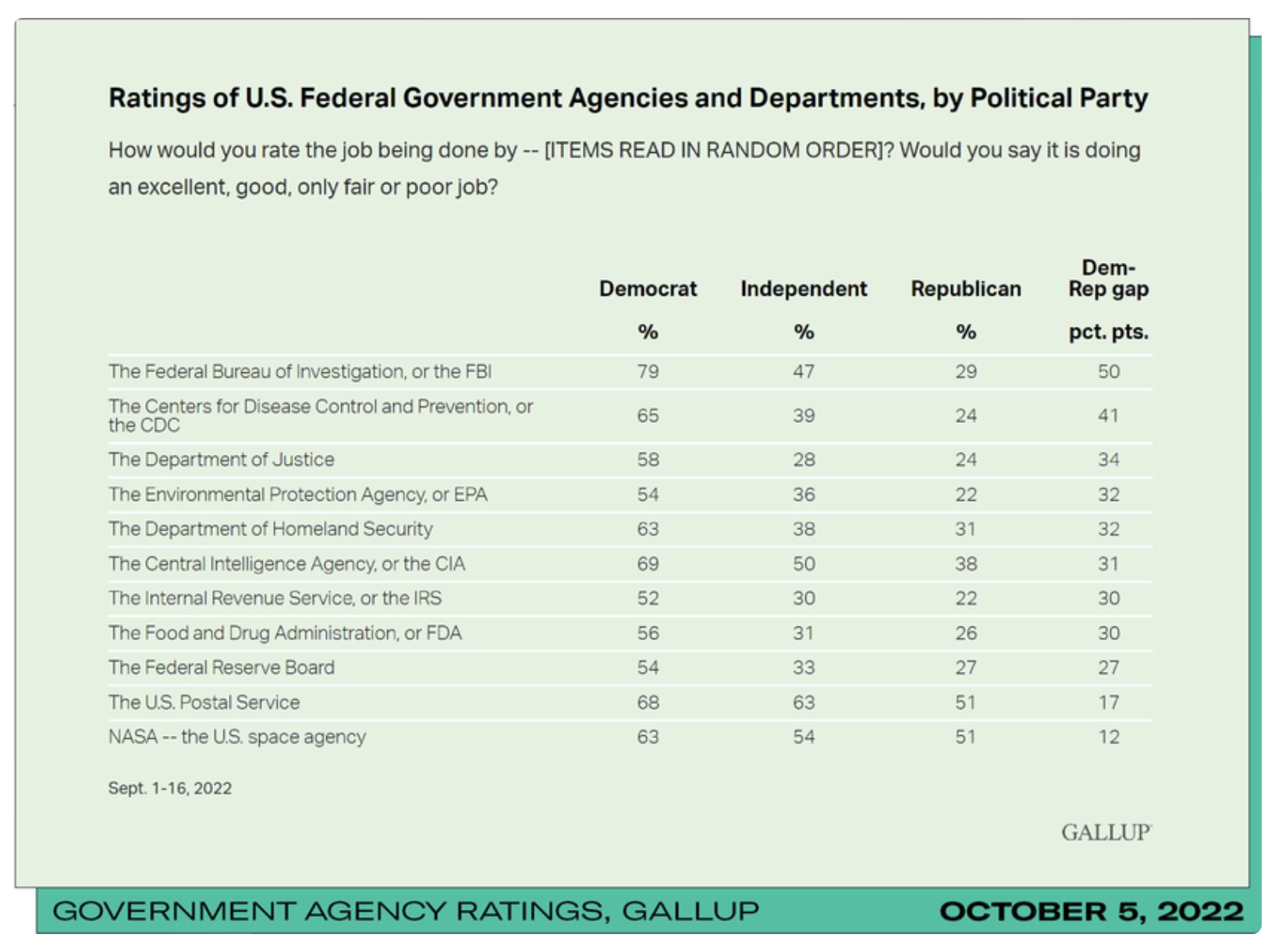Here are the numbers, a Gallop poll from 2022:

Glenn Greenwald comments on the dramatic change in the attitudes of Democrats:
So, here you see the FBI: 79% of Democrats think the FBI is doing an excellent or good job. For decades, distrust of the FBI and a view that it is a fundamentally corrupted organization pervaded and shaped federal politics. That is gone. Democrats worship the FBI. We report on those hearings all the time in the House where Democratic members of the House, of Congress, stand up and applaud the U.S. security state for censoring the Internet on the grounds that these agencies are benevolent, have nothing but the most patriotic and noble intentions and want to protect us from disinformation. So here you see the FBI with 79% trust among Democrats; among Independents, about half, 47%, and among Republicans, 29%.
So, essentially, the FBI is seen to a purely partisan end or political framework, ideological framework. They have immense powers, they operate in secrecy, they spy on Americans, they investigate crimes and the only people who really trust them are Democrats. Independents are split. Republicans overwhelmingly view them as corrupt.
It's even worse for the Department of Justice. Only 58% of Democrats trust the Department of Justice; 28% of Independents think the DOJ is doing a good job; only 24% of Republicans. So, imagine how much this is going to exacerbate that distrust. These remarkable and extraordinary prosecutions were brought during an election against the leading political opponent of the current government.
And then you have the CIA. When I tell you that opposition to the CIA has long been a central plank of left-liberal politics, I cannot overstate that case. To be on the left meant that it viewed the CIA as a malevolent institution forever, for decades, until 2016, and you see the reversal happen immediately. The reason for it is so disturbing. It's because the CIA – and the FBI – is where Russiagate came from, and liberals started recognizing validly that the CIA and the FBI and Homeland Security and the NSA and the Justice Department were on their side. They were political allies of the Democrats. And so now you have this remarkable reality that 69% of Democrats – 69% – think the CIA is doing a good or excellent job: 69% of Democrats. To be a Democrat is basically to mean that you place a lot of faith and trust in the CIA and even among this 30%, that won't say it; you barely can find opposition to the CIA in mainstream laughable discourse Turn on podcasts or YouTube programs of self-proclaimed leftists. I don't mean real leftists like the kind we have on our show, like the Black Revolutionary Network, but I mean, like the ones in the Democratic Party, the ones who follow Bernie Sanders and AOC. You will not hear a peep of meaningful denunciation of the CIA if they mention them at all. It's very much in passing with no passion, with no concern, because they don't consider the CIA menacing, because they know the CIA is their political ally. The CIA is not supposed to be anyone's political ally. They're not supposed to have anything to do with American politics and yet everyone knows they do. And they have to explain these percentages.
Here you see 50% of independents. So again, independents are split like they are with the FBI; 38% of Republicans have positive views of the CIA, largely from probably decades of Republican politics, the establishment weighing the hawkish wing of the Republican Party that has long viewed the CIA as an important ally. But that has cratered. And here you see the massive partisan split and how these agencies are viewed and the fact that a huge chunk of the country believes that these institutions are politically corrupted and fundamentally and irretrievably broken. It's a massive crisis of institutional authority in the United States. And it's aimed at the agencies that are now the ones responsible for trying to prove that the indictment of President Trump is illegitimate, invalid.



